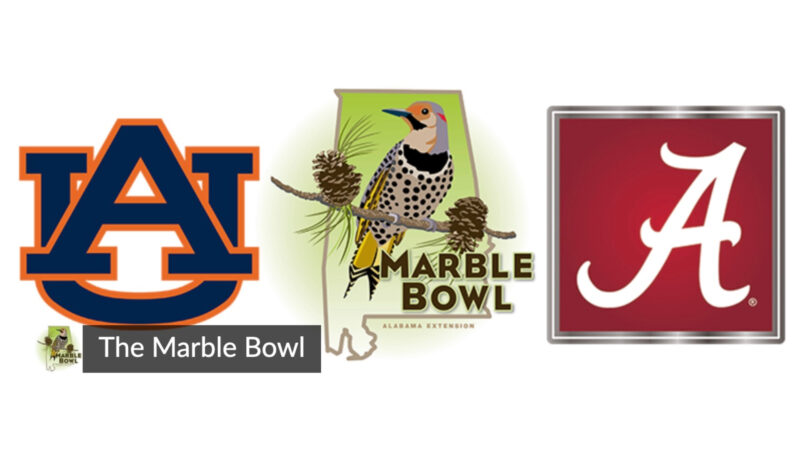In the Marble Bowl, the heated rivalry between Alabama and Auburn is getting ‘wilder’
The Marble Bowl, pitting Auburn versus Alabama fans, is designed to track the rich biodiversity of the state.
The Marble Bowl is a competition that pits fans of the University of Alabama against Auburn University. No tight ends or cornerbacks, quarterbacks or linebackers are needed, although they can play, too.
In this bowl game, anyone with a smart phone can play. Instead of taking a snap from the center, a participant snaps a photo of plants and animals in the wild, then uploads those pics to the iNaturalist app.
Those photos are then identified, in part, by the app using artificial intelligence. It’s all part of an ongoing effort to document the state’s rich biodiversity and any changes caused by invasive species and climate change.
Wesley Anderson is a professor at Auburn’s School of Forestry, Wildlife and Environment. He came up with the idea for the bowl, named after the state rock, since the Iron Bowl shares its name with the state mineral.
“Citizen science is becoming more and more important every year,” Anderson said. “So, my thought was we need more people, or as many people as possible, participating in these sorts of efforts.
“The idea was to gamify it and to play on the rivalry between the University of Alabama and Auburn University.”
The score is calculated from a combination of unique observations and species. Whichever team gets the highest score is the winner.
John Friel is the director of the Alabama Museum of Natural History. He’s Anderson’s counterpart in Tuscaloosa.
“We’re really interested in documenting the biodiversity in the state,” he said. “We’re just using this as an opportunity for a friendly competition.”
Friel notes Auburn has won the two previous Marble Bowls, and while he says he’d like to win this year, competition is not the point.
“Overall, the state’s winning, because we’re learning more about the biodiversity in our backyards,” he said. “We want to just get people interested in looking at nature, just stop and smell the roses.”
And, as is the way of the Southeastern Conference, Anderson and Friel are looking to expand, possibly getting more schools and their citizen scientists involved.
“We want to open it up to anybody and everybody,” Anderson said. “Any institution of higher ed, including junior and community colleges, international universities. We’d like to try and mimic March Madness.”
Anderson said the iNaturalist project is a form of outreach, teaching people to be better stewards of the environment.
“Citizen science and these biodiversity observations – this is, in the future, going to play a much larger role in biodiversity monitoring,” Anderson said.
As for this year, anyone who’s interested, still has time to get in the game. Just download the iNaturalist app, then chose either Auburn or Alabama in the Marble Bowl 2024 project.
The competition accepts photos shot between Saturday, August 31 – the beginning of the college football season – and the end of Iron Bowl weekend, 11:59 p.m. Sunday, December 1. Currently, Auburn is in the lead, but, not surprisingly, the score is close and the competition is fierce.
Parents, are you sure your kid’s car seat is installed right? Here’s how to know
In this visual guide, certified car seat experts walk through common installation mistakes and how to fix them. Learn what a secure car seat base and a tightly fastened tether look like and more.
Trump announces ‘major combat operations’ in Iran
Israel and the U.S. have launched strikes against Iran, with explosions reported in Tehran and air raid sirens sounding across Israel.
Trump says he is ‘not happy’ with the Iran nuclear talks but indicates he’ll give them more time
U.S. President Donald Trump said Friday he's "not happy" with the latest talks over Iran's nuclear program but indicated he would give negotiators more time to reach a deal to avert another war in the Middle East.
Bill Clinton says he ‘did nothing wrong’ with Epstein as he faced grilling over their relationship
Former President Bill Clinton told members of Congress on Friday that he "did nothing wrong" in his relationship with Jeffrey Epstein and saw no signs of Epstein's sexual abuse as he faced hours of grilling from lawmakers over his connections to the disgraced financier from more than two decades ago.
How the federal government is painting immigrants as criminals on social media
Experts say this kind of media campaign is unprecedented and paints a distorted picture of immigrants and crime
Pentagon puts Scouts ‘on notice’ over DEI and girl-centered policies
After threatening to sever ties with the organization formerly known as the Boy Scouts, Defense Secretary Hegseth announced a 6-month reprieve








